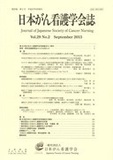Japanese
English
- 販売していません
- Abstract 文献概要
- 参考文献 Reference
要旨
本研究は,外来で放射療法中のがん患者へPurpose in Life test(以下,PILテスト)を手がかりとした看護介入を実施し,QOLや心理的適応への効果について検討した.
外来で放射線療法を受けるがん患者を対照群(20名),介入群(19名)に無作為に振り分け,研究対象者とした.介入群には放射線療法開始時にPILテストを実施し,その結果を手がかりに研究者と患者で対話し,その効果を3時点(放射線療法開始時,終了時,終了3カ月後)で,Quality of Life Radiation Therapy Instrument 日本語版(以下,QOL-RTI),Mental Adjustment to Cancer 日本語版(以下,MAC)の質問紙で評価した.介入の有無(対応なし)と,放射線療法開始時・終了時・終了3カ月後の時期(対応あり)の2要因分散分析(混合計画)を行なった.その結果,全対象者では,MACの下位概念であるhelpless/hopeless(絶望感)の交互作用に有意傾向が認められ(p<0.10),介入群は,放射線療法開始時から経過にともなって絶望感が減少していく傾向がみられた.QOL-RTIには有意な交互作用は認めなかった.今回の対象者で60%を占めていた乳がん患者をみると,QOLの総得点とQOL心理/ 精神得点において,交互作用に有意差が認められ(p<0.05),介入群において,放射線療法開始時から時期の経過にともなって,QOLとQOLの精神心理面の改善がみられていた.
これらのことから,外来で放射線療法を受ける患者と研究者が,人生観や病気苦悩観,死生観について対話するという相互作用の機会をもったことで,絶望感軽減に影響を与え,乳がん患者にはQOLとQOLの精神心理面の改善効果が推察された.
This study implemented nursing interventions based on the Purpose in Life (PIL) test for outpatients with cancer undergoing radiation therapy, and examined their effects on quality of life (QOL) and psychological adjustment.
Outpatients with cancer undergoing radiation therapy were randomly assigned to a control group (20 patients) or to an intervention group (19 patients) as study participants. The PIL test was distributed to the intervention group at the start of radiation therapy and there was a dialogue between the researcher and the patient based on the results. The effects were examined at three stages (at the start of radiation therapy, at the end of therapy, and three months after the end of the therapy) with the Japanese versions of the Quality of Life Radiation Therapy Instrument (QOL-RTI) and Mental Adjustment to Cancer (MAC) questionnaires. The two-way mixed analysis of variance (ANOVA) was performed between the presence or absence of intervention (unpaired) and at certain times during the treatment process at the start of radiation therapy, the end of treatment, or three months after the end of treatment (paired). The results suggesed interaction had a significant effect on helpless/hopeless, a subscale of MAC, in all participants (p<0.10). In the intervention group, helpless/hopeless tended to decrease with the beginning of radiation therapy. There were no significant effects of interaction in QOL-RTI. However, in patients with breast cancer, who accounted for 60% of this study, significant differences were found regarding the interaction effects in the total QOL and spiritual/mental scores (p<0.05). The intervention group showed improvement in QOL and mental and spiritual aspects after radiation therapy started. These findings suggest that the experience of mutually interactive dialogue between outpatients undergoing radiation therapy and researchers regarding their views on life, disease, or death helped decrease the helpless/hopeless feelings in patients. Furthermore, it demonstrated remedial effects on QOL and its mental and spiritual aspects in patients with breast cancer.
Copyright © 2015, Japanese Society of Cancer Nursing All rights reserved.


